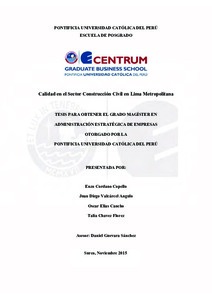| dc.contributor.advisor | Guevara Sánchez, Daniel Eduardo | |
| dc.contributor.author | Cordano Copello, Enzo | |
| dc.contributor.author | Valcárcel Angulo, Juan Diego | |
| dc.contributor.author | Elías Cancho, Oscar | |
| dc.contributor.author | Chavez Florez, Talía | |
| dc.date.accessioned | 2019-08-29T17:15:19Z | |
| dc.date.available | 2019-08-29T17:15:19Z | |
| dc.date.created | 2015-11 | |
| dc.date.issued | 2019-08-29 | |
| dc.identifier.uri | http://hdl.handle.net/20.500.12404/14872 | |
| dc.description.abstract | El sector de construcción civil en el Perú, ha obtenido una mayor relevancia
debido al fuerte crecimiento que ha obtenido en la última década. Este crecimiento se ha
debido en su mayoría al desarrollo de programas gubernamentales de vivienda;
obtención de mayores facilidades de financiación; reactivación de la autoconstrucción y
desarrollo inmobiliario de tipo privado, en su mayoría en la ciudad de Lima, como
consta en la presente investigación
El objetivo principal de esta investigación fue el de averiguar el grado de
cumplimiento de Factores de calidad (TQM) de las empresas constructoras en Lima
Metropolitana, pertenecientes a la muestra estudiada, e identificar si hay una diferencia
significativa en este nivel de cumplimiento entre las empresas que tienen un Sistema de
Gestión de Calidad (SGC), con los que no tiene ninguna. Los datos han sido obtenidos a
través de informes técnicos por parte de entidades público y privadas; periódicos y
revistas reconocidos en el medio; pero principalmente a través de encuestas y
entrevistas a actores importantes del sector.
Los resultados del presente estudio muestran que más del 80% de las empresas
de construcción en Lima Metropolitana que pertenecen a la muestra estudiada no
contaban con un Sistema de Gestión de Calidad (SGC) y que sólo un 18,84% contaba
con alguno; siendo este, un porcentaje bajo en relación al total de la muestra. En la
investigación se comprobó que las empresas de la muestra que cuentan con un SGC,
mostraban un promedio más alto en los nueve factores de TQM en comparación con
aquellos que no tienen uno. Así mismo, que los factores de TQM que presentaban
mayor diferencia entre las empresas que contaban con SGC y las que no; son los factores de círculos de calidad, auditoria y evaluación de la calidad, que son los
relacionados al seguimiento y control dentro de las empresas.
Los resultados de esta investigación se consideran relevantes como punto de
partida para futuras investigaciones para aquellos que requieran contar con un panorama
sobre la coyuntura del sector construcción civil en Lima, en relación al grado de
cumplimiento de factores de calidad del TQM. Al contar con un alto margen de error en
la presente investigación, los resultados obtenidos en la investigación, no se podrán
generalizar a toda la población. | es_ES |
| dc.description.abstract | The civil construction sector in Peru, has gained greater significance due to the
strong growth it has achieved in the last decade. This growth was due mostly to the
development of government housing programs; obtaining greater financing facilities;
reactivation of the self and private real estate development type, mostly in the city of
Lima, as stated in the present investigation
The main objective of this research was to determine the degree of compliance
of Quality factors (TQM) of construction companies in Lima, belonging to the sample,
and identify if there is a significant difference in the level of compliance among
businesses they have a Quality Management System (QMS), with which it has none.
Data have been obtained from technical reports by public and private entities;
newspapers and magazines recognized in the middle; but mainly through surveys and
interviews with key players in the sector.
The results of this study show that over 80% of construction companies in Lima
belonging to the sample did not have a Quality Management System (QMS) and only
18.84% had some; and this, a low percentage compared to the total sample. In the
investigation it was found that companies in the sample have a QMS, they showed a
higher average in the nine TQM factors compared to those who do not have one. Also,
that factors of TQM presenting major difference between companies that had SGC and
no; are the factors of quality circles, audit and quality assessment, which are related to
the monitoring and control within companies.
The results of this research are considered relevant as a starting point for future
research for those who need to have an overview of the situation of the civil
construction sector in Lima, regarding the degree of compliance with quality factors of TQM. Having a high margin of error in this research, the results of the investigation,
cannot be generalized to the entire population. | es_ES |
| dc.language.iso | spa | es_ES |
| dc.publisher | Pontificia Universidad Católica del Perú | es_ES |
| dc.rights | info:eu-repo/semantics/openAccess | es_ES |
| dc.rights.uri | http://creativecommons.org/licenses/by-nc-nd/2.5/pe/ | * |
| dc.subject | Calidad total | es_ES |
| dc.subject | Industria de la construcción--Perú--Lima | es_ES |
| dc.subject | Investigación cuantitativa | es_ES |
| dc.title | Calidad en el sector construcción civil en Lima Metropolitana | es_ES |
| dc.type | info:eu-repo/semantics/masterThesis | es_ES |
| thesis.degree.name | Maestro en Administración Estratégica de Empresas | es_ES |
| thesis.degree.level | Maestría | es_ES |
| thesis.degree.grantor | Pontificia Universidad Católica del Perú. CENTRUM | es_ES |
| thesis.degree.discipline | Administración Estratégica de Empresas | es_ES |
| renati.advisor.dni | 09412483 | |
| renati.advisor.orcid | https://orcid.org/0000-0002-6374-8062 | es_ES |
| renati.author.dni | 10542966 | |
| renati.author.dni | 41823736 | |
| renati.author.dni | 43786089 | |
| renati.author.dni | 10618640 | |
| renati.discipline | 413307 | es_ES |
| renati.level | https://purl.org/pe-repo/renati/level#maestro | es_ES |
| renati.type | https://purl.org/pe-repo/renati/type#tesis | es_ES |
| dc.publisher.country | PE | es_ES |
| dc.subject.ocde | https://purl.org/pe-repo/ocde/ford#5.02.04 | es_ES |






